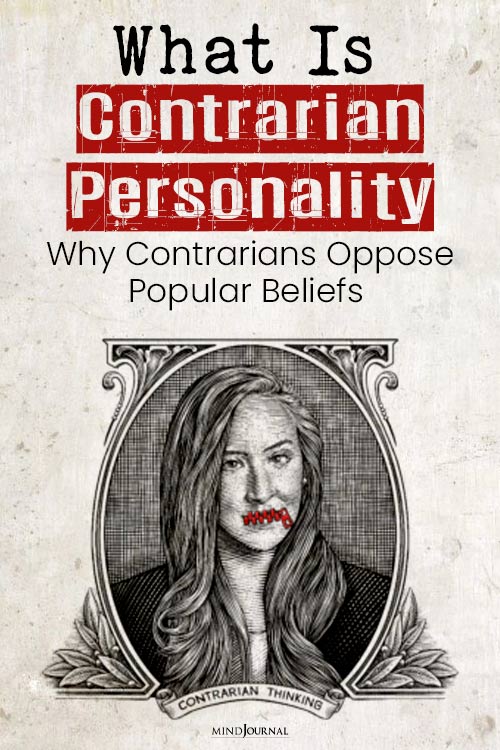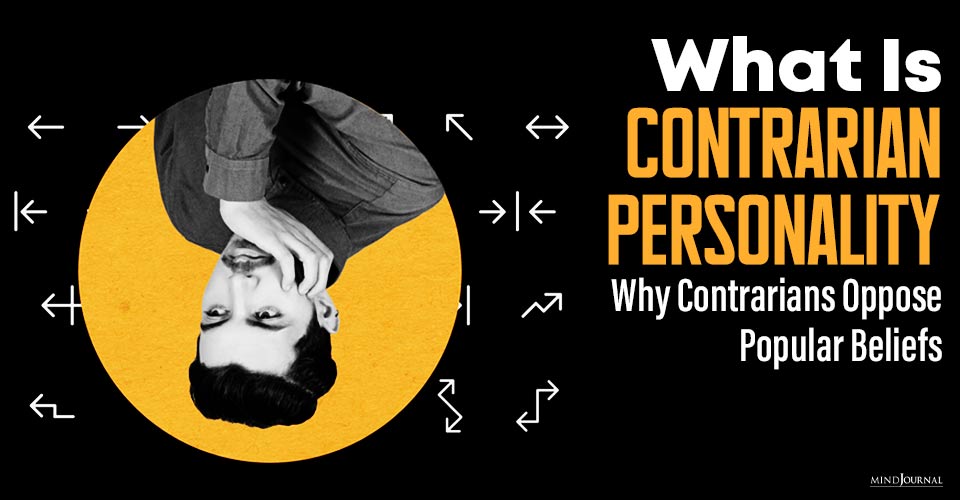Do you refuse to conform? Do you often take an opposing position to what the majority believes? Then you might be contrarian thinking. So what makes someone a contrarian? Let’s find out.
What is contrarian thinking?
Contrarian thinking refers to a thought process that involves opposing conventional wisdom or having counterintuitive views. Someone with a contrarian personality goes against popular opinion and holds a contrary position in a discussion.
Not only they may oppose the opinion of the majority, they may even reject the opinions of others and tell others that their viewpoints are wrong.
Even though contrarian individuals may appear stubborn and resistant, they develop their own beliefs, philosophies, and rules. This can be a good thing from a social perspective as everyone thinking the same way can lead to making the same mistakes.
Although a person with contrarian thinking may be seen as a miscreant or deviant by sociologists, they are considered free thinkers by psychologists.

Contrarian thinking or contrarianism are seen both negatively and positively. While people with a contrarian mindset may be seen as stubborn, denialist, headstrong and difficult, they are also considered unorthodox, counterintuitive thinkers, and brave.
They have the inner strength to stand against the crowd and refuse to accept norms that most people accept without questioning.
Related:10 Signs You Are An Independent Thinker
Regardless of how the contrarian personality type is seen by others, these individuals tend to have drastically different views and opinions.
What is the psychology of a contrarian?
Contrarians tend to be rebellious and are not afraid to question the most sacred beliefs. They can scrutinize even the most basic rules and ideas and may even argue against their own beliefs just to gain a different perspective.
They believe that the majority of the population willingly accepts social rules, standards, and norms without understanding their importance and value. People with contrarian thinking question everything as it is intellectually stimulating and allows them to get out of their default mode of thinking.
Their active and smart minds are bustling with ideas that compel them to evaluate notions that others accept blindly. This helps them explore new ideas and tread new paths.
Someone with a contrarian attitude tends to be an obstinate individual. However, contrarian thinking is believed to be associated with free-thinking as such individuals go against the tide instead of simply believing what they are told or conforming to social norms blindly.
A contrarian thinker is always ready to discuss and debate. They are nonconformists who are wise & knowledgeable and love to deconstruct concepts. Unfortunately, they can be rather quarrelsome and argumentative, leading to complications in friendships and relationships.
Related: How Rigid Thinking And Rumination Undermines Your Health And Life
Contrarian personality type
People with contrarian thinking are believed to have the ENTP personality type, one of the personalities in the Myers-Briggs Type Indicator (MBTI). The ENTP personality type, also known as the debaters, tends to be extroverted, intuitive, thinking, and perceiving and shows signs of contrarian thinking.
Individuals with such personalities prefer to analyze and evaluate ideas and love to play the devil’s advocate. Not only do they love to develop their own independent views and opinions, but they also analyze their own strongly-held opinions and beliefs just to have a differing view.
People with an ENTP personality and contrarian thinking can easily counter any concept, idea, or belief with logic and understanding. However, they can often be very straightforward and blunt, which most people may find offensive.
Although they may make informed arguments, they are typically seen as arrogant, insensitive, and rude. Their tendency to discuss ideas based on reasoning and logic, instead of feelings and personal perspective makes them seem different and separate from the majority.
But an MBT – ENTP is highly curious, open-minded, and focused on personal growth. In fact, they can be excellent friends, someone you can learn a lot from if you are willing to accept their blunt attitude.
Related: 10 Signs You Are An ENTP Personality Type
Challenges with contrarian thinking
Many renowned philosophers, leaders, and inventors had a contrarian mindset, such as Napoleon, Plato, Martin Luther King, Gandhi, Steve Jobs, etc.
When you have a contrarian personality, you are bound to face obstacles and challenges in your daily life, relationships, and especially in your career. In fact, it may even affect your social reputation due to your non-conformist attitude.
When you think differently, the majority will see you as an outcast. Being against the prevalent and popular opinion can make people think that you are against them, making them develop a negative attitude towards you or ignore and avoid you in least.
This is perhaps one of the weaknesses of contrarian thinkers as it becomes difficult for them to develop new connections and relationships due to their different thinking and perspective.
Here are some other common weaknesses of contrarian thinkers that lead to different challenges –
- Highly argumentative
- Appears to be arrogant, rude, and insensitive
- Tends to be emotionally immature
- Usually disorganized
- Self-destructive behaviors
Related: Dichotomous Thinking: How Black and White Thinking Can Affect Your Health
Benefits of contrarian thinking

Making conscious decisions and choices is one of the strengths of contrarian thinkers. They live intentionally based on their own beliefs and philosophies. Instead of being swayed by the wind of popularity, people with contrarian thinking question authority.
They ask difficult questions that others are afraid to ask and take steps that everyone else avoids due to the effort and courage required.
Instead of living a life of comfort and going through the motions relying on their unconscious minds, contrarian thinkers make conscious efforts to build the life they want. They realize that just because something is widely accepted, it doesn’t necessarily mean that it’s right.
People with the traits of a contrarian personality, have an attitude of awareness and know how to take purposeful action. They refuse to stay in their comfort zone and are always willing to put in all the hard work needed to break free of social conformity. Conscious & purposeful thoughts and actions are crucial for self-development.
Let’s take a quick look at some other strengths of contrarian thinkers –
- Open-minded
- Strategic
- Problem solvers
- Adaptable
- Curious
Related: Why Facts Don’t Change People’s Minds: Cognitive Dissonance
How to deal with a contrarian personality
If your friend, family or a loved one is a person with contrarian thinking, then it is likely that you have a hard time communicating with them without running into an argument. So here are a few tips that can help you to carry a conversation with a contrarian without complicating your relationship dynamic –
1. Before sharing your views on a particular topic, ask about their views on it. This can help you understand what you can agree upon and what you can agree to disagree with.
2. When they express contradicting views, instead of countering or arguing with them, try to listen to their point of view. Understand their motivations and intentions as this can help you learn something new.
3. Keep your focus on facts, data and logic. Instead of being emotional or taking their opinions personally, focus on the information at hand instead of making assumptions.
4. When they become argumentative or quarrelsome, try to change the topic or ask them about the point of arguing for the sake of argument. Focus on ending the conversation when it gets heated by changing the power dynamic.
Related: How To Stop Arguments? 5 Emotional Self-Regulation Skills For Constructive Arguments
Takeaway
Individuals with contrarian thinking are rebellious, practical, and action-oriented. Granted, they have strong opposing views and tend to question socially accepted concepts and beliefs, but they do not argue for the sake of argument. They strongly believe what they say and are willing to risk social isolation for their opposing beliefs.
It takes strength and confidence to think differently, which can lead to different outcomes, both positive and negative. Contrarians observe what most others fail to notice. And this is why they play a crucial part in social development, even if society may not agree with their viewpoints.
Related: 10 Ways To Develop Logical Thinking Skills











Leave a Reply